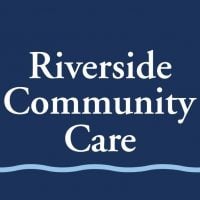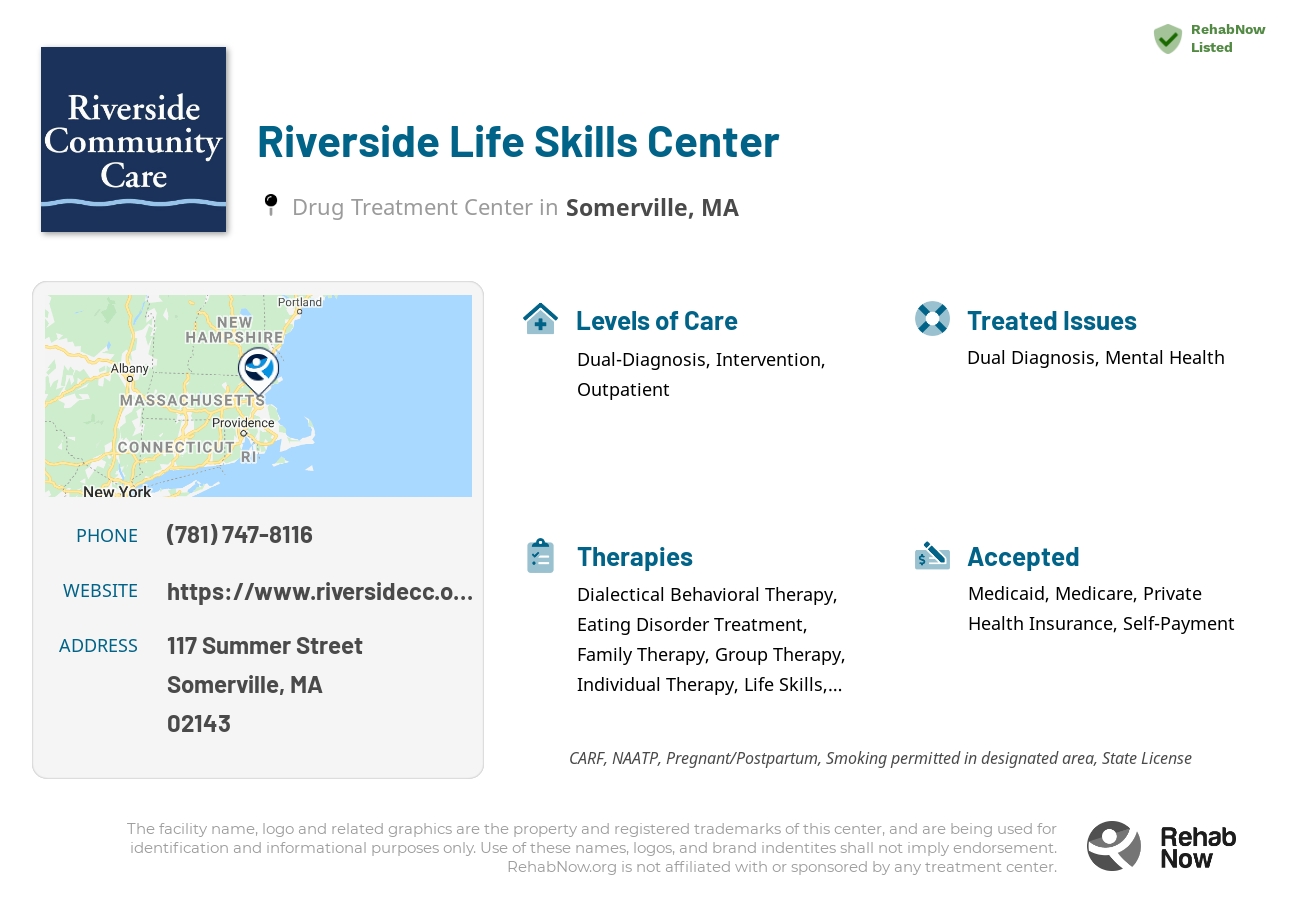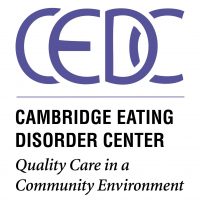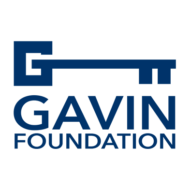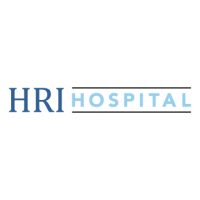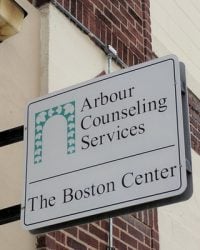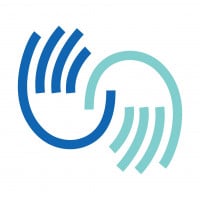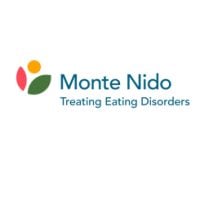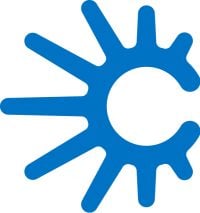About This Massachusetts Facility
Riverside Life Skills Center is an addiction treatment facility in Somerville, Massachusetts that specializes in treating people suffering from dual diagnosis, eating disorder, mental health, and drug and substance abuse. They offer a variety of services and levels of care, customized to each individual’s needs, including dual-diagnosis, intervention, outpatient, and aftercare support. With a focus on providing person-centered and evidence-based care, Riverside is affiliated with Riverside Community Care and accepts private health insurance.
Riverside Life Skills Center offers a wide range of addiction and substance abuse services to meet the needs of their clients. Their team of dedicated professionals is committed to providing comprehensive and personalized treatment that is designed to treat the whole person and address the underlying causes of addiction. To ensure their services are of the highest quality, Riverside is accredited by The Joint Commission, licensed by the Massachusetts Department of Public Health, and certified by the Massachusetts Department of Mental Health. Furthermore, they have staff trained in Acceptance and Commitment Therapy, Dialectical Behavioral Therapy, Cognitive Behavioral Therapy, and Motivational Interviewing.
Genders
Ages
Modality
Additional
Conditions and Issues Treated
When addiction and psychiatric issues co-occur, the addict’s recovery is more successful when both conditions are treated. A dual diagnosis refers to a condition in which the patient is diagnosed with two health issues: addiction and bipolar disorder.
Usually, dual diagnosis sufferers are prescribed a combination of treatments for each condition. The most common therapies are psychotherapy, behavioral therapy, spiritual counseling, 12-step programs, and medication management.
Psychiatric conditions are an obstacle to recovery because they can create roadblocks to a healthy lifestyle. Drugs and alcohol may be used as a means of self-medication, which can have dangerous consequences. Over time, addicts build up a tolerance and suffer withdrawal symptoms when drug use is stopped.
With the proper treatment, dual diagnosis sufferers can overcome their conditions and achieve lasting sobriety.
Levels of Care Offered at Riverside Life Skills Center
This center offers a variety of custom treatment tailored to individual recovery. Currently available are Dual-Diagnosis, Intervention, Outpatient, with additional therapies available as listed below.
Individuals struggling with drug addictions can get help from several treatment options, including inpatient and outpatient programs. Outpatient drug treatment programs can also provide patients with different levels of care, usually depending on the patient’s degree of addiction.
At an outpatient program in Somerville, a patient will attend a recovery program during the day and return home in the evening. Suppose a patient is struggling with drug addiction. In that case, an outpatient program can serve as an effective transition point during the recovery process.
Intervention services are designed to help family members and friends confront an addict about their drug use. While some addicts will immediately seek treatment after this confrontation, others don’t want to quit or need professional help with the process.
During an intervention, family members and friends work with a professional interventionist who will lead them through the discussion. This professional will help the addict understand that they need to get treatment and provide them with resources for recovery.
Therapies & Programs
Individual therapy is a critical component of addiction recovery. It allows the patients to go deep into their core issues and discover how to handle those problems better. Therapy can be conducted in individual sessions as well as group settings. In individual therapy for addiction, the patient meets with their therapist one-on-one to focus on the underlying issues. This allows patients to open up and discuss personal topics they may not feel comfortable discussing in a group setting. This type of therapy can help develop solutions specific to each patient, which helps speed up the recovery process.
Family therapy is a crucial part of drug treatment and getting sober. It is one of the most effective ways to help addicts stay on the path to long-term sobriety. When a drug addict decides that they want to try and get sober, it takes the support of every person they love to succeed. It can be incredibly difficult for loved ones to watch an addict go through the pain and suffering of withdrawal, but by being there with them and supporting them, they can help to make sure that the addiction never returns.
One of the most important parts of family therapy is the relapse prevention plan. During treatment, therapists and doctors will often sit down with the addict and their family to develop a plan in case the addict ever feels like they want to use again. This plan should involve steps the addict and family can take together to prevent them from relapsing in the future. An addict’s family can play a vital part in helping them to avoid relapse because they can spot the warning signs and help them get back on track before it becomes too much of a problem.
Group therapy helps prevent addicts from feeling isolated or unique in their situation by offering a sense of comfort and fellowship. It also creates a forum for addicts to build their support systems and learn from each other. The group therapy sessions at Riverside Life Skills Center occur in a group setting rather than one-on-one to create a safer, controlled environment where addicts feel comfortable.
Trauma therapy helps people dealing with addiction by allowing them to confront the traumas of their past and move past them. It is important to note that trauma therapy should not be confused with PTSD (post-traumatic stress disorder) Rather, it is used to treat the effects of trauma, which are often at the root of addiction.
Dialectical Behavior Therapy was developed in the 1980s to treat chronically suicidal individuals. It is a cognitive-behavioral therapy that combines strategies derived from Zen Buddhism, such as mindfulness training. DBT has been adapted for use with other types of psychiatric problems, including substance abuse and personality disorders. DBT aims to help patients change their thinking and behavior, instead of relying on medication.
Cognitive Behavioral Therapy (CBT) is a common therapeutic approach to help drug addicts. It teaches addicts new ways of thinking and behaving so that they can avoid relapse. There are several forms of CBT used in drug rehabilitation centers.
Cognitive Restructuring helps addicts identify faulty, negative thinking so that they can work together with the therapist to find healthier ways of thinking, resulting in better decision-making.
Cognitive Behavioral Therapy for Addiction uses the principles of CBT to help treat addiction. It focuses on specific aspects of each person’s thinking, feeling, physiology, and behavior. It aims to identify specific problems in these areas and create a personalized treatment strategy.
The best drug treatment centers offer various services to help addicts learn how to live without drugs. Since addiction is a chronic physical and mental illness, addicts need to learn as many life skills as possible to help them stay clean and sober.
Many drug treatment centers like Riverside Life Skills Center offer life skills activities as part of their addiction recovery programs. Examples include cooking classes, employment training, resume writing seminars, parenting classes, and computer training. When addicts have various life skills to lean on, they’re better equipped to put their addiction behind them for good.
The primary goal of life skills activities at drug treatment centers like Riverside Life Skills Center is to help addicts recover from addiction and learn how to live a useful, productive life. Life skills activities help addicts find employment, take care of their families, and give back to the community. After learning about these various life skills, addicts are better prepared to return to society and lead happy healthy lives.
Payment Options Accepted
For specific insurance or payment methods please contact us.
Is your insurance accepted?
Ask an expert, call (888) 674-0062
Riverside Community Care Associated Centers
Discover treatment facilities under the same provider.
- Riverside Community Care - Milford in Milford, MA
- Riverside Community Care - Needham in Needham, MA
- Riverside Community Partners BH CP - Connect2Recovery in Dedham, MA
- Riverside Psychiatric Day Treatment in Wakefield, MA
- BH CP Riverside Team - Milford in Milford, MA
Learn More About Riverside Community Care Centers
Additional Details
Specifics, location, and helpful extra information.
Somerville, Massachusetts 2143 Phone Number(781) 747-8116 Meta DetailsUpdated November 25, 2023
Staff Verified
Patient Reviews
There are no reviews yet. Be the first one to write one.
Somerville, Massachusetts Addiction Information
Massachusetts has one of the highest rates of drug abuse in the country. More than half a million Massachusetts residents abuse alcohol while more than 1.5 million use illegal drugs each year. This drug and alcohol usage is the cause of over 8% of all deaths in the state. In 2017, Massachusetts ranked in the top 10 of the states with the highest opioid overdose rates.
About 1,500 people in Somerville struggle with addiction to drugs or alcohol. One-third of high school students have used drugs within the past month. About 1,500 people in the city struggle with addiction to drugs. There are only about 10 rehab centers in the city, which means a very limited amount of resources are available. Over 100,000 people in the city are in urgent need of treatment for substance abuse.
Treatment in Nearby Cities
- Norwell, MA (22.2 mi.)
- Ashby, MA (41.7 mi.)
- Johnson City, MA (732.8 mi.)
- Rutland, MA (43.2 mi.)
- New Bedford, MA (52.6 mi.)
Centers near Riverside Life Skills Center
The facility name, logo and brand are the property and registered trademarks of Riverside Life Skills Center, and are being used for identification and informational purposes only. Use of these names, logos and brands shall not imply endorsement. RehabNow.org is not affiliated with or sponsored by Riverside Life Skills Center.
